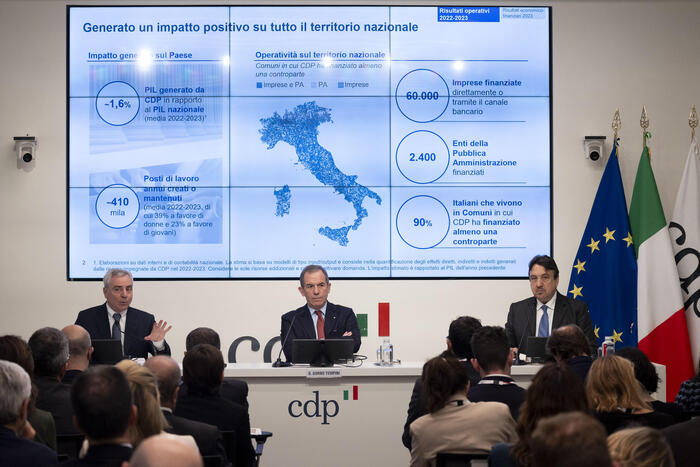Enlarge image
Vanguard headquarters
Photo: Steven M. Falk / picture alliance / Philadelphia Inquirer
In the middle of the bad 2001 stock market year - the internet bubble had just burst and the attack on the World Trade Center was still to come - I found an exciting article in the Wall Street Journal on the costs of fund investments.
There I was able to read that Americans could buy their funds much cheaper than people in this country.
That was 20 years ago.
Behind this there was stiffer competition on the US market at the time.
Especially those of the Vanguard fund company.
It belongs to its investors as a kind of cooperative.
Vanguard was already propagating index funds (ETF) back then, and the company launched the first for small investors in 1976.
This is why these funds were quite popular in the US in 2001.
The idea: Vanguard did not pay expensive management for these funds to select one stock and not the other.
Rather, the company simply bought shares in all companies above a certain size for its investors, i.e. all members of a share index.
Index funds: It depends on the cost
The focus on low costs is actually quite logical for a cooperative.
Investments based on the self-help principle must above all be inexpensive and should not create any additional work for the comrades.
And because it is an investment for small investors, it should be as safe as it can be with stocks.
In an interview with the New York Times, Vanguard founder John C. Bogle once summed up the idea of making inexpensive, safe funds available to small investors as well: “When you invest, you earn money you
don't
have to pay.
It depends on the cost. "
At Vanguard, in addition to the entire index fund, for reasons of tradition, Bogle also operated a managed equity fund - but also here for record-breaking low 0.17 percent fees.
On average, managed equity funds in the USA cost just under one percent at the time.
In Europe, index funds did not gain a foothold until later.
Vanguard's big competitor Blackrock is meanwhile with our own index funds as well as the Deutsche Bank subsidiary DWS or the fund companies of French, Swiss and British major banks.
This change was inconvenient for the fund managers; the ETF fees for the fund companies are much lower than for actively managed funds.
But the strategists at the fund companies had certainly also read the remarkable admission by the fund rating agency Morningstar.
After the financial crisis, Morningstar calculated in 2010 that, from the investor's point of view, the particularly low-priced funds would bring a higher return on investment than the star rating.
Since then, Morningstar has regularly proven that very few professional fund managers do better than the much simpler passive funds, i.e. often ETFs that only follow an index.
Indexes - the bigger the better
There are share index funds for individual countries, for all shares of the euro countries, the EU or all of Europe. There are indices for developed countries like the MSCI World, ethical and environmental indices and funds that really want to capture the whole world of public companies in around 50 countries.
In fact, Vanguard is also way ahead in terms of time here. The Pennsylvania fund company launched a European retail fund on the FTSE All World index in 2012. The index of the London Stock Exchange, introduced in 2004 by the Financial Times, consists of 3900 values from 49 countries, which were worth a total of 65.700 billion dollars at the last recount this spring. More than 80 percent of all stocks worldwide and four times as much as the total annual economic power of the EU. The decision in favor of the FTSE index is based on the fact that the use of FTSE is cheaper for the fund company, says the company, but the index is just as good as the competitor index from MSCI.
In such truly global all-world indices, there are not only stock corporations from Apple to Zalando from the classic industrialized countries, but also companies from China such as Alibaba or Tencent, from South Korea such as Samsung or Kia and the other fast-growing economies in Southeast Asia, then of course Russia, South Africa and Brazil and a few other Latin American countries.
At the New York competitor of the London-based FTSE, the global index is called MSCI ACWI, i.e. instead of MSCI World, MSCI All Countries World Index.
Isn't investing in China and Argentina unsafe?
In the past, small investors were reluctant to invest in such so-called emerging markets. In the past five years, however, indices with “emerging economies” were even a bit more stable than those with only industrialized countries. Embedding it in a global basket of stocks helps. Our analysis at Finanztip shows a significantly lower volatility, which means that these indices have not been up and down that much recently.
And the global indices are of course much more stable than an investment in Germany alone.
Small side effect of the many countries: Individual large industrialized countries with their stock corporations cannot dominate the index that much.
When the MSCI World was launched 35 years ago, it had a very high weighting in Japanese equities, and in the past two decades it was increasingly weighting in US equities, well over 60 percent.
These weights are, of course, lower if companies from 26 or 27 other countries are included in addition to the industrialized countries.
My colleagues at Finanztip recently did the math:
For the long-term investor, both are a good idea - only classic industrialized countries or those with emerging markets, the returns averaged 9.5 percent per year over the past five years.
Only the fluctuation of the truly global indices was smaller.
Incidentally, index funds that rely on more sustainable variants of the indices also show such stable performance.
In fact, the particularly large indices react particularly unmoved to the course of the world if one wanted to establish a difference.
In the case of sudden, brief crashes, this can even prove itself: In the Corona crash in February and March 2020, for example, the Dax fell 40 percent in one month, while the MSCI World with its 1,600 values and the FTSE All-World with its 3900 values only between 28 and 29 percent
As a small investor, do I have to do something differently now, aware of the larger dimensions, the almost 50 countries and almost 4,000 stock corporations?
Rather not.
If you've been investing in a fund on the MSCI World for years, you can stick with it.
You now know
There are also two even more comprehensive indices on offer that would at least have brought as much returns in the past: the MSCI All Countries World Index (AWCI) and the Financial Times SE (FTSE) All-World.
And you know that the fees for your very large, very market-wide funds can go even further down.
The pioneer Vanguard last lowered its fees in autumn 2019.
From the investor's point of view, the goal should be costs that are as low as those of the Norwegian sovereign wealth fund, i.e. 0.04 percent per year.
There are already large funds in the US that are so cheap.
Wonderful prospects.
Or to speak to fund pioneer Bogle: “Time is your friend.
Your opponent, on the other hand, is spontaneous. "









